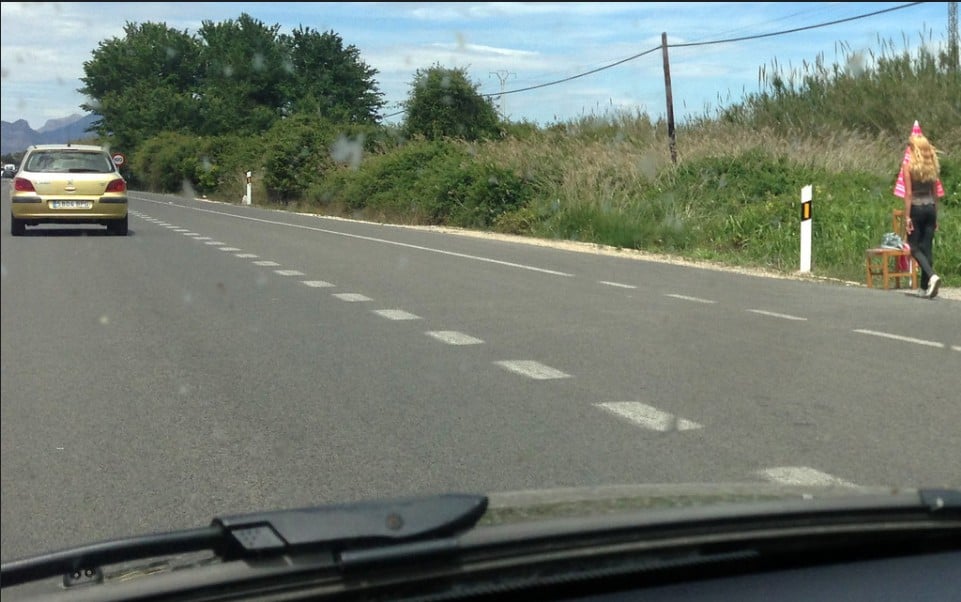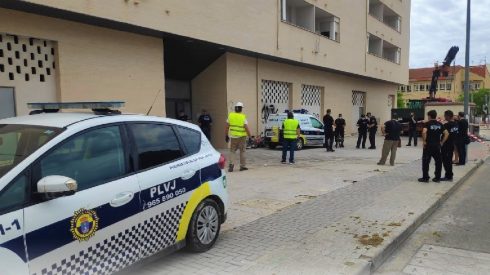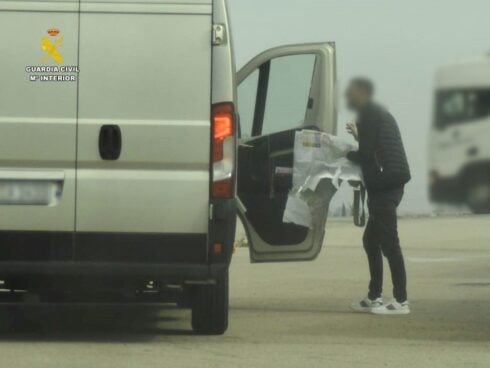SEX WORKERS are continuing to ply their trade from the Abbeygate roundabout on the A7 despite the threat posed by the coronavirus pandemic, an Olive Press investigation has discovered.
For the last five years, locals said at least one woman can be spotted daily on the busy road between Estepona and Sabinillas.
Residents believe at least three women are putting their health at risk, with one being nicknamed Pippa by the residents because of the trail of sunflower seeds she leaves behind each day.
The roundabout where the sex workers sit is also littered with plastic bottles and used condoms – a sight that has disturbed local families.
Susan Davies said: “It depicts a complete lack of respect for people living in this area.
“It’s unhygienic because they do not wear masks, leave their rubbish on the road and their used condoms by the park for children to tread on.
“It is as though they are taking the piss because nobody can do anything about it.”
Recent retiree Bridget Michaels, 60, said pimps may be forcing the women to continue working.

The grandmother, originally from Romford who relocated to Buenas Noches in Estepona last year, said she was concerned that some of the sex workers at the Abbeygate roundabout may be underage.
She told the Olive Press: “They all live in Sabinillas and I believe it’s a Romania mother and her daughters. Sometimes they bring other girls but I question whether they are even 18.
“There is definitely a pimp because a few weeks ago we heard that the men were firing shots at each other.
“It is a shame because otherwise, this is such a lovely town. But I believe the town hall has prioritised spending the money to make Estepona look gorgeous and not enough funding the police. Safety has been put aside.
“The numbers of officers have decreased over the years here and I would hate to imagine us going the same way as La Linea because there are not enough police to ensure the safety of the residents.”
The Spanish government estimates that up to 90% of women working in prostitution could be victims of trafficking or under the control of a third party – such as a pimp – who is profiting from them.
Prior to 2010, human trafficking was not considered a crime in Spain but between 2012-2016, security forces in Spain rescued 5,695 people from slavery.

For years residents living near Abbeygate have been demanding action, urging the town hall to investigate the problem and increase police funding to allow more officers on the street to help curb street prostitution.
Ben Luoma, a teacher from Estepona, told the Olive Press: “I cycle through the area often and I am aware of the existence of the problem
“There are inherent risks associated with engaging in this work at the side of such a busy road and I would like to see the police and town hall do more to ensure that people keep themselves safe.
“Where there is intelligence to suggest that people are being exploited, the police need to take swift and decisive action.
“My main concern is that some of the women, some of whom are very young, have been forced or coerced into prostitution rather than making an informed lifestyle choice to engage in street sex work.”
The three women are said to be charging upwards of €20 for sex acts. An Estepona resident who passes the women on her way to Gibraltar each day said she believes the prostitutes may have no other way to support themselves or loved ones.
Anna Routledge, 24, said: “Where the women are standing there is not any housing so as a resident I don’t have a problem with it per se, I just think it is sad to see that women in the area are not being given better opportunities and therefore are having to lower themselves to this type of work.
“I always see the same faces, it’s always the same two or three girls. It is obviously not something they want to do because who would want to stand all day in the heat on a busy road.
“I would like to see the community here support these street sex workers out of the business, otherwise you risk relocating the issue, rather than resolving it through enforcement alone.”
Estepona lawyer Cristina Molina López said the problem has been raised at countless Estepona town hall meetings over the years but is still no closer to a resolution.
“They are limited to what they can do,” Cristina explained. “The women are not doing anything wrong by standing there and they have legal support to do so. But the police and town hall are trying to support it with the tools that they have.”
In 2011, a United Nations report cited Spain as the third biggest capital of prostitution in the world, behind Thailand and Puerto Rico – and ten years on little has improved.
The legality around sex work in Spain remains murky and despite decriminalising sex work in 1995, the country still does not have a clear policy on the matter.
Over a decade ago then Prime Minister José Luis Rodríguez Zapatero pledged to eradicate prostitution adverts which are still carried by almost all daily newspapers today.
Recent research revealed estimated there were 300,000 sex workers across the country, with Spain’s domestic sex trade believed to be worth around $26.5bn a year.
In some parts of Spain, such as Sevilla, police follow what is known as the Sevilla Ordinance, which considers sex workers as victims of gender violence and criminalises the buyers, fining them anything between €750 and €1,500.
The main objective is to decrease demand by punishing the soliciting of sexual services and offer a more caring approach to sex workers, who are often vilified more than the clients.
Research has shown men are less inclined to purchase sex if it runs the risk of them getting a criminal record.
In Barcelona, Valencia and Malaga, however, the sex workers are criminalised and can be punished with fines of up to €300.
In Estepona, Cristina believes the legal grey area and low police numbers make it difficult for the situation to be resolved but has faith that a continued police presence will help minimise the issue.
“I always say to our clients, they have to call the police. If the police are at the roundabout the women won’t go near it,” she said.
But Cristina is also wary of emphasising the importance of tackling the issue at its core, adding that the community needs to move forward with ‘an important educational mission’ and create a programme of lessons that teaches men from a young age that treating women as commodities which can be bought and sold is wrong.
“The problem here is not only the women,” she said. “There are people that contract their services, that’s the real problem. If nobody stopped there, the women would not be there. So the clients are the real problem.”
READ MORE:
- OPINION ‘Stop soliciting on our streets’: Why residents in Spain are right to speak out
- EXCLUSIVE: Sex workers meeting clients in British expat hotspots despite Spain’s strict coronavirus lockdown while brazenly advertising ‘COVID specials’
- New Sexual Freedoms Act could spell an end to Spain’s brothels
Click here to read more News from The Olive Press.








